The German shepherd is one of the most beloved and well-known dog breeds in the world. Millions of dog lovers have welcomed the stunning German shepherd into their homes. They have learned what an incredible companion this breed can be. Their fierce loyalty makes them a wonderful addition to any family! And their intelligence helps them land a variety of important canine working roles. It’s no wonder this versatile breed has captured the hearts of dog lovers everywhere. Many people are looking to adopt their very own German shepherd pup. If this is the case for you, you’ll want to know about German shepherd progression.
We want you to be as prepared as possible for your future German shepherd family member. So, let’s dive into everything you need to know about their care below. Ranging from their growth progression to their common health complications, let’s discuss it all!
Brief German Shepherd Summary
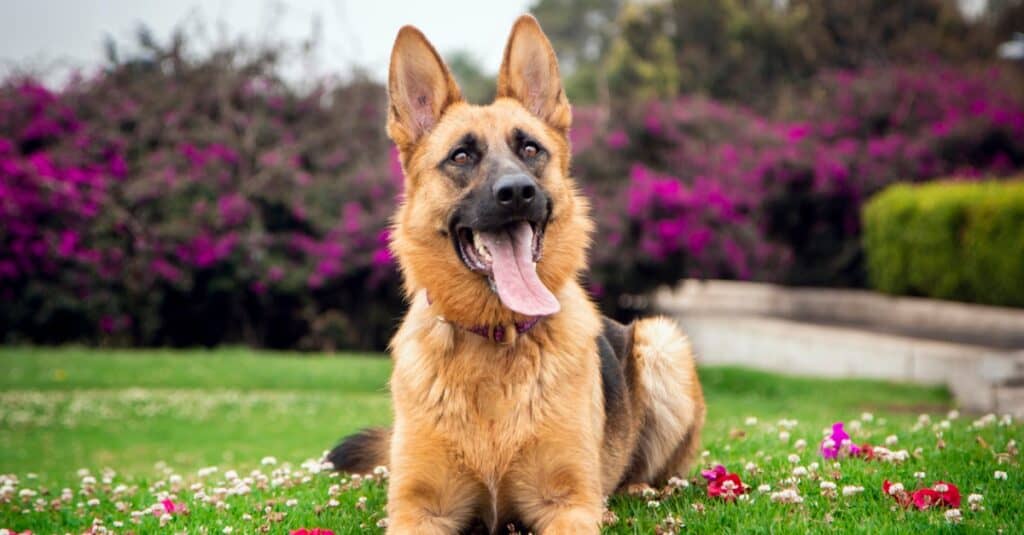
The German shepherd breed is intelligent, loyal, playful, protective, and so much more.
©iStock.com/VictorRicoFoto
The German shepherd was originally created in Germany to be the ultimate herding dog. But the breed now exists in every corner of the globe. However, many German shepherd dogs (GSD) still work in life-saving positions. These range from search and rescue to police work. These dogs have a variety of qualities that make for a wonderful canine companion as well. They are intelligent, loyal, playful, and protective pups!
If you are the proud parent of a German shepherd, you know just how incredible they are. We want to give you the tools needed to better understand your German shepherd. Let’s hop into our detailed German shepherd breed guide.
German Shepherd Growth and Weight Chart by Age
When welcoming a German shepherd into your family, you’ll need to know how much they will weigh as they grow! Every German shepherd will vary, but we can offer you some averages to better understand what lies ahead.
| Age | Male Weight | Female Weight |
|---|---|---|
| Birth | About 1 pound | About 1 pound |
| 1 Month | 6-9 pounds | 6-9 pounds |
| 6 Weeks | 9-14 pounds | 9-14 pounds |
| 2 Months | 16-20 pounds | 16-20 pounds |
| 3 Months | 21-31 pounds | 21-31 pounds |
| 4 Months | 32-40 pounds | 32-35 pounds |
| 5 Months | 41-49 pounds | 35-44 pounds |
| 6 Months | 50-57 pounds | 44-50 pounds |
| 7 Months | 57-62 pounds | 48-53 pounds |
| 8 Months | 62-66 pounds | 52-56 pounds |
| 9 Months | 63-71 pounds | 53-59 pounds |
| 10 Months | 65-73 pounds | 58-62 pounds |
| 11 Months | 71-75 pounds | 60-64 pounds |
| 12 Months | 71-79 pounds | 60-64 pounds |
| 2-3 years | 71-84 pounds | 60-69 pounds |
Every German shepherd will vary based on their genetics. The best way to estimate their eventual size is to meet the dog’s parents!
When Will My German Shepherd Stop Growing?
If you welcome a German shepherd puppy into your home, you will see just how much they grow in the first year of their life. Their rapid growth rate may have you wondering when your beloved pup will finally stop putting on the pounds, and when you can appreciate their true adult size.
Though every German shepherd will vary, most German shepherds will stop growing between the ages of two to three years. The GSD is considered an adult once they hit 18 months of age, but you will see them continue to fill out as the next year passes. Once your German Shepherds hits the three-year mark, it’s safe to say they have reached their true size.
How Big Will My German Shepherd Be When It’s Fully Grown?
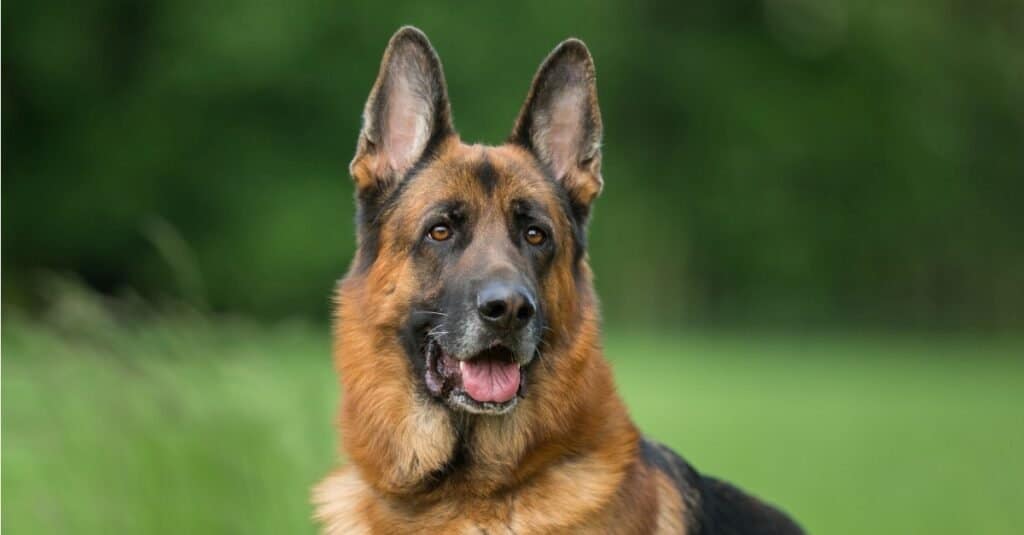
German shepherds will continue to grow until they have reached two to three years of age.
©BIGANDT.COM/Shutterstock.com
Just as we mentioned above, most German shepherds will continue to grow until they have reached two to three years of age. While there are slight size differences when discussing male and female German shepherds, there is an average size that you can typically expect from your beloved German shepherd pup.
On average, most German shepherds will weigh anywhere from 60-84 pounds once they have reached three years of age, and they will reach up to 2 feet in height at the shoulder. Just keep in mind that this is just an average, and the best way to predict your dog’s adult size is by meeting their parents.
The Biggest German Shepherd Ever Recorded
The average German shepherd will not exceed 84 pounds, but there will always be a few outliers that set impressive weight records for their breed! This stands true for the German shepherd as well, and there is one impressive Shepherd pup that steals the title as the biggest German shepherd on record.
The biggest German shepherd ever recorded is a magnificent GSD named Duke. He set this record in 2014 in Tennessee, and he weighed in at an incredible 131 pounds! Not only is his size impressive enough, but he also had a male offspring that come close to him in size.
Learn about the biggest dogs on record here!
When Should My German Shepherd Stop Eating Puppy Food?
Puppy food is essential for our growing canine friends for a variety of reasons. Food created for puppies contains vital ingredients needed to help them grow big and strong, and it sets them up for a healthy future ahead. Puppy food also contains more calories per cup than the average adult dog food, as dogs require more calories each day as they maneuver these growth periods.
Since dogs need the extra calories as they continue to grow into their adult size, then this means the German shepherd should eat puppy food until they’ve reached at least 18 months of age. While some German shepherds will still grow until two to three years of age, the growth will not be as drastic during this period. Once they’ve reached 18 months of age, you can transition them to an adult food made for large breed dogs.
When Should My German Shepherd Be Spayed or Neutered?
Spaying or neutering your beloved German shepherd can offer a variety of health and behavioral benefits. Not only are you preventing any unwanted pregnancies, but you are promoting their health and happiness as well.
Spaying and neutering a dog decreases their risk of reproductive cancers and infections, behavioral struggles and aggression, as well as the desire to roam. Though the benefits of sterilization are not debated, the best time to spay and neuter a German shepherd is still up for debate.
Though opinions vary across the board, most veterinary professionals agree that spaying or neutering your German shepherd between the ages of six to 12 months is best. Sterilizing during this timeframe will still significantly decrease their risk of developing reproductive cancers, and it should still cut back on any unwanted behaviors that are driven by hormones.
Just keep in mind that every dog will vary based on their specific needs and health status, so we suggest speaking to your vet about what timeframe is best for your German shepherd’s spay or neuter.
When Will My German Shepherd Start Losing Teeth?
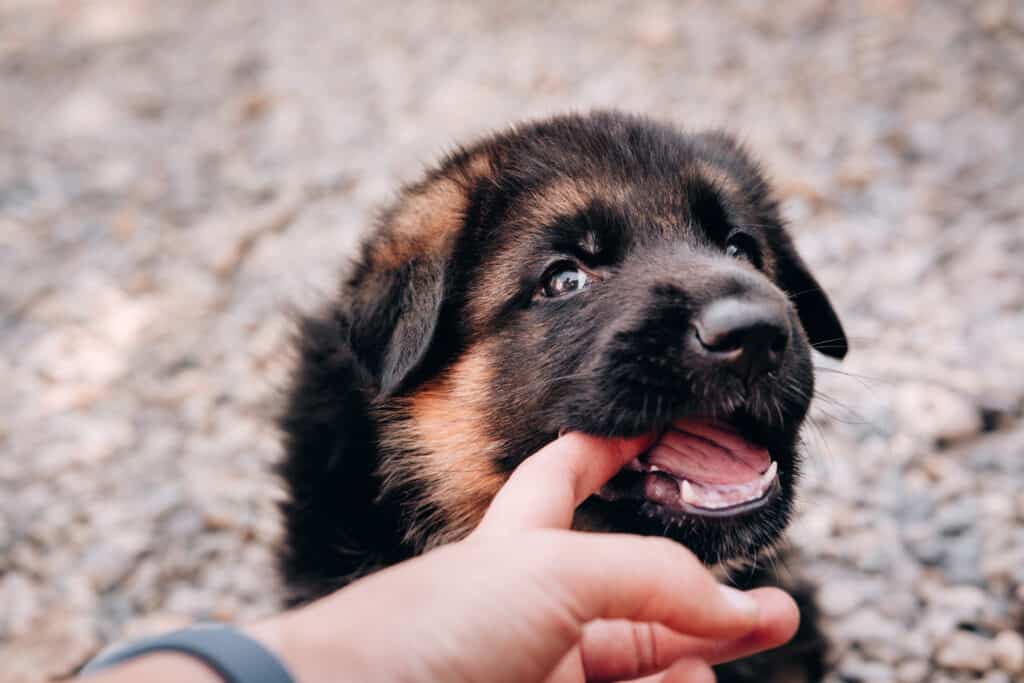
Most German shepherds will begin to grow their first set of baby teeth around the age of three weeks old.
©lightman_pic/Shutterstock.com
Just as human children will have a set of baby teeth that fall out over time, our German shepherd friends are no different! Most German shepherds will begin to grow their first set of baby teeth around the age of three weeks old, and they should have a full mouth of baby teeth by six weeks of age.
Once the German shepherd puppy reaches 12 weeks of age, their permanent teeth will begin to erupt from their gums. This will essentially push out their baby teeth, causing them to fall out as their adult teeth grow in. This means that your German shepherd puppy may start to lose baby teeth at 12 weeks of age, and they may continue to lose teeth until they reach six months of age. By the time your German shepherd reaches six months of age, he should have a full set of permanent teeth.
When Should I Start Training My German Shepherd?
The German shepherd is known for being highly intelligent, and they love to have a purpose. So, while training often comes easy to the German shepherd puppy, it also means that obedience training is essential to create a well-rounded adult shepherd. Oftentimes, the smarter the breed, the more training that is required to keep them out of mischief!
When it comes to the German shepherd puppy, we always suggest starting their training from the moment they enter your home. So, whether you adopt your German shepherd at eight weeks or six months of age, you should jump into an obedience training program at that time. A well-rounded training routine for German shepherds will not only involve basic obedience training, but socialization to other pets and people as well!
What Commands Should I Teach My German Shepherd First?
The German shepherd is a lovable breed, but they do require well-rounded obedience training to help them become a safe and productive member of your family. Due to how protective and loyal the German shepherd can be, this means these traits can easily become unmanageable when they do not understand basic obedience.
For this reason, there are a few commands that we think all German shepherd puppies should learn! This includes:
- Sit
- Stay
- Lay down
- Come
- Drop it
In addition to the commands we listed above, it is also essential to socialize your German shepherd pup safely throughout their obedience training. This includes introducing them to new people in and outside of your home, introducing them to safe dogs, and exposing them to unfamiliar places and sounds. The better socialized your German shepherd is, the less likely it is for them to struggle with aggression toward other people and animals.
Just remember that you should not allow your German shepherd puppy to interact with unknown dogs until they are fully vaccinated against parvovirus and canine distemper. You can take them to public parks and walking trails after they have received their second round of vaccines, but we do not suggest bringing them around unfamiliar dogs until they have received all three rounds of their puppy vaccinations.
When Will My German Shepherd Calm Down?
German shepherds are known to have quite a bit of energy, but they are especially playful during the first three to four years of their life. This is comparable to the energy levels a human child experiences into his teenage years, and it eventually settles down once adulthood sets in.
Energy levels will vary from dog to dog, but the average German shepherd will begin to calm down once they reach four years of age. They will still enjoy daily exercise and their favorite games, but they should be less hyperactive throughout the day.
Common Health Issues Your German Shepherd Might Experience
Most German shepherds will live a healthy and active life, but there are a few health complications they are more prone to experiencing. Some of the common health issues seen in German shepherds include:
Hip Dysplasia
Hip dysplasia in dogs refers to a condition in which the dog’s hip joints do not form properly. This can lead to instability of the hip joint, which eventually leads to inflammation and deterioration of the joint over time. This condition is known to be very painful for the dog affected, so you will often see limping, stiffness, a change in gait, difficulty getting up from a seated position, muscle wasting in the back end, and even lameness.
Arthritis
Arthritis in dogs is a condition in which the dog’s joints break down over time. German shepherds are especially at risk due to the prevalence of other joint conditions in their breed. Symptoms include joint stiffness, difficulty getting up and down, limping, changes in gait, joint swelling, and even lameness.
Gastric Dilatation Volvulus (GDV)
German shepherds have a higher chance of developing GDV due to their deep chests. Also known as bloat, GDV refers to the condition in which the dog’s stomach flips on itself, which traps the stomach contents and blocks blood flow to and away from the stomach. This is a fatal condition, and dogs require immediate medical care to save their life. The signs of GDV in dogs include retching but being unable to vomit, abdominal distension, weakness, pale gums, weak pulses, and collapse.
Epilepsy
German shepherds are at risk of developing a seizure disorder known as epilepsy. Most dogs develop the disorder around the ages of two to four, and it is described by the onset of sudden seizures and other neurological abnormalities.
Degenerative Disc Disease
This condition can lead to the deterioration of the outer portion of the discs within the canine spine. Due to this, dogs can suffer from extreme pain, and they can even become paralyzed over time. Common signs include limb weakness, a rigid posture, crying out when touched, and knuckling of the hind paws.
Pictures of German Shepherds as Puppies
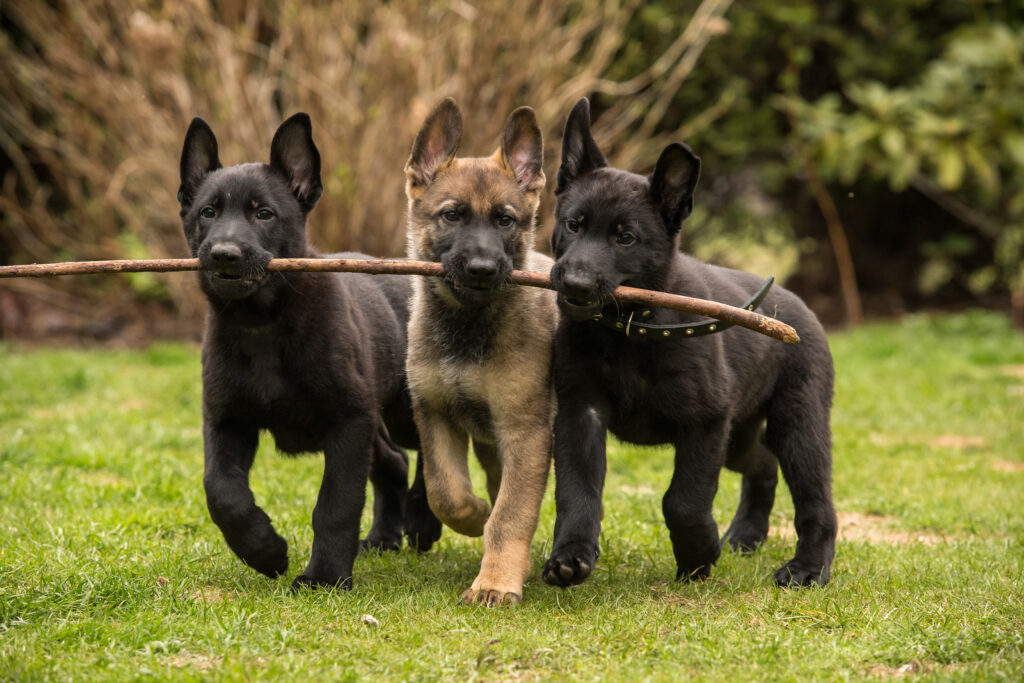
This adorable group of German shepherd puppies loves to share a big stick!
©DTeibe Photography/Shutterstock.com
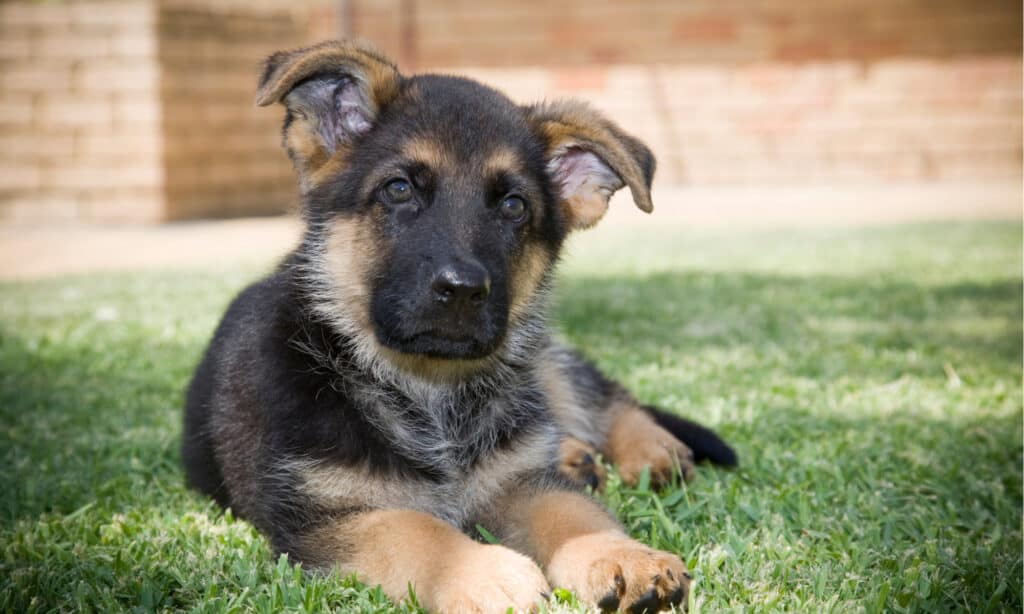
German shepherd puppies have large floppy ears!
©Tap10/Shutterstock.com
Pictures Of German Shepherds At 6 Months
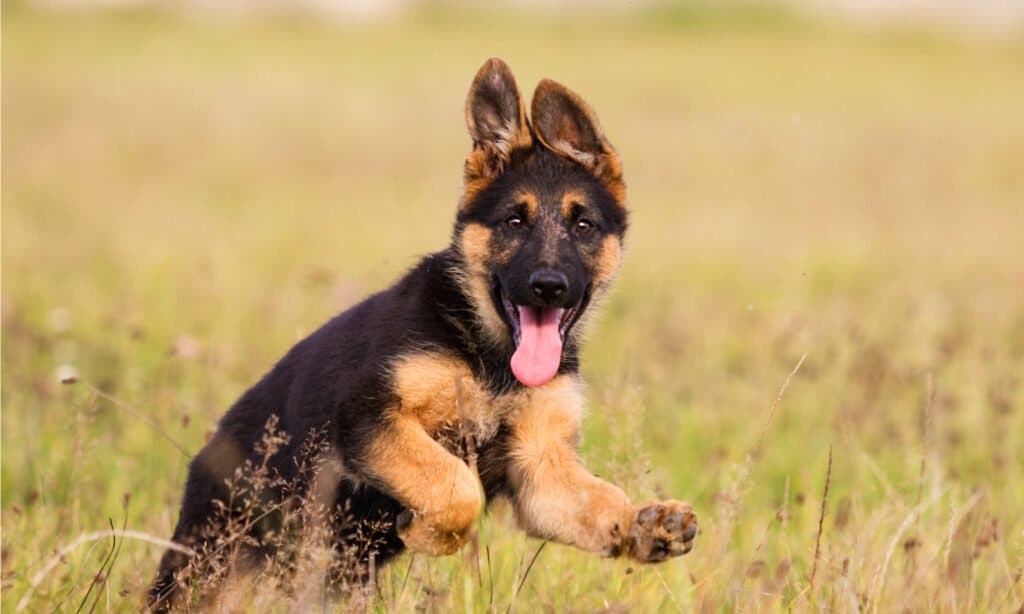
German shepherd puppies will start to fill out around four to six months of age.
©Happy monkey/Shutterstock.com
Pictures Of Fully Grown German Shepherds
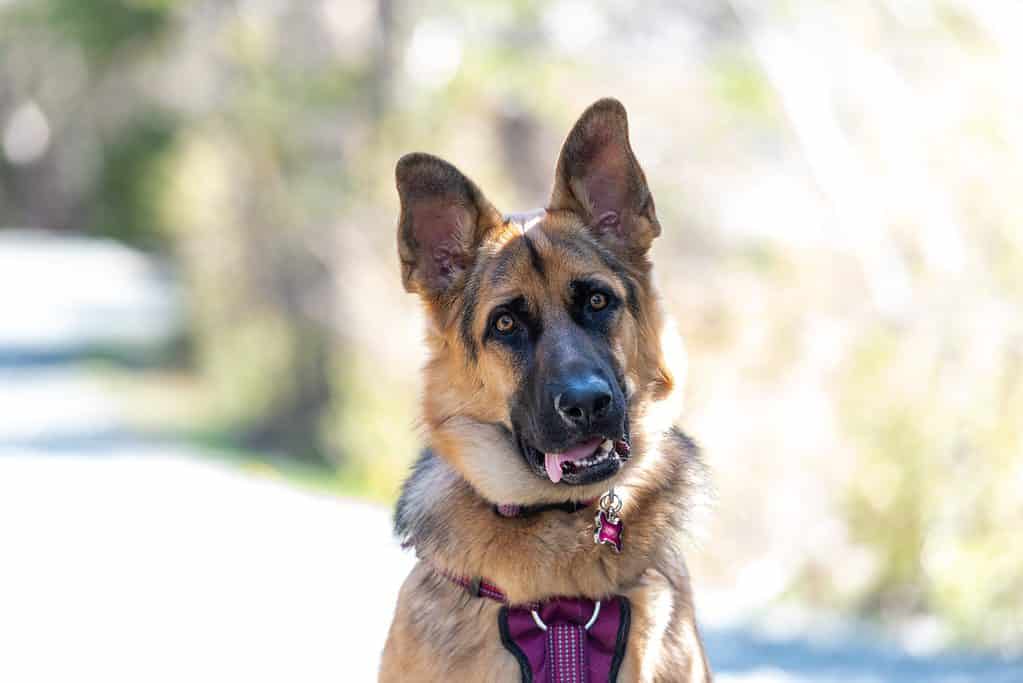
German shepherds grow into beautiful large, adult dogs.
©Dolores M. Harvey/Shutterstock.com
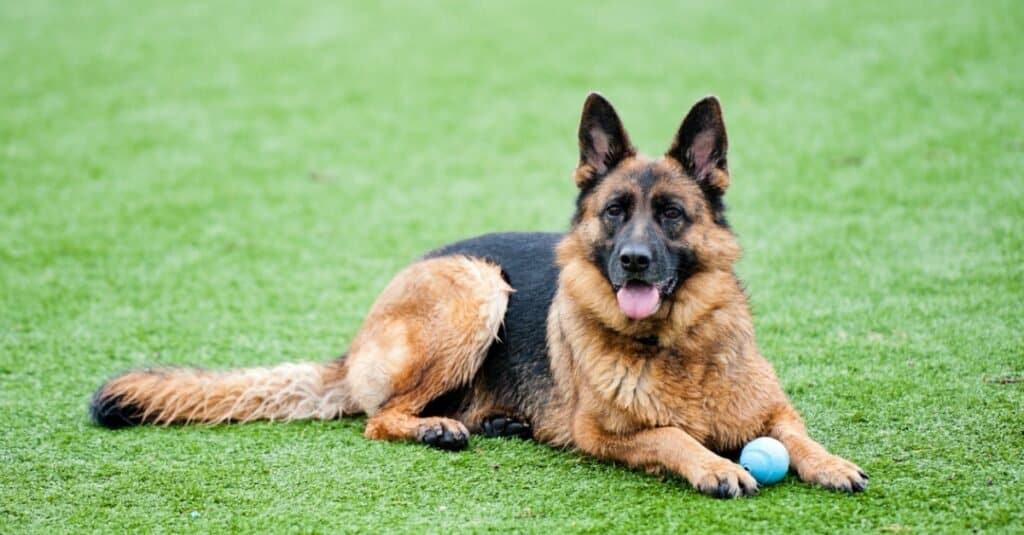
German shepherds love to play fetch with their owners.
©iStock.com/jentakespictures
The German shepherd is a stunning breed with so much love to give! Are you ready to welcome a German shepherd into your family?
The photo featured at the top of this post is © Dora Zett/Shutterstock.com
Ready to discover the top 10 cutest dog breeds in the entire world?
How about the fastest dogs, the largest dogs and those that are -- quite frankly -- just the kindest dogs on the planet? Each day, AZ Animals sends out lists just like this to our thousands of email subscribers. And the best part? It's FREE. Join today by entering your email below.
Thank you for reading! Have some feedback for us? Contact the AZ Animals editorial team.






